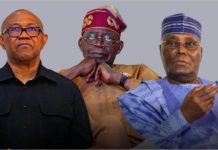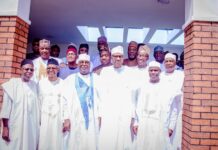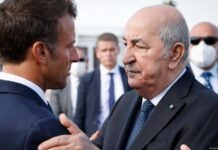President Muhammadu Buhari yesterday expressed his disappointment with the performance of his security chiefs saying they were not doing enough to end the security challenges in the country despite the humongous logistics provided by his administration.
The president spoke through the national security adviser, Major General Babagana Monguno (rtd) after a 240-minute meeting of the national security council at the State House, Abuja presided by Buhari.
According to the NSA, the president was not comfortable that his previous directives to the military to end insecurity in the country had not yielded good results.
Addressing journalists after the meeting, the NSA said the president had therefore directed all the operational and intelligence agencies to rescue unhurt, all persons kidnapped by terrorists, including those in the recent Kaduna-bound train.
Monguno said there was no way the president would be happy, when people were being killed on a daily basis. He said the last straw was the recent attack on the Abuja-Kaduna train, which led to the death of some passengers, with scores kidnapped.
“The President spoke about his sadness in respect of recent security challenges and developments we have had in the country, in particular the incident in which several Nigerians lost their lives with many more taken into captivity by criminals and bandits.
“Not just those that were captured during the last Kaduna –bound train incident but those that have been in captivity in other parts of the country.
“The President has directed all the operational and intelligence elements to rescue all of these innocent people immediately and unhurt. This is the basis on which other issues were discussed.
“The chief of defence staff, the service chiefs and the inspector general of police all briefed the president on occurrences in their respective organizations,” Monguno said.
The NSA also said he made some recommendations on how to tackle the security challenges confronting Nigeria adding that the president was reviewing the recommendations.
“I submitted a memo to council and my recommendations are being looked into by the president. My recommendations are wide ranging and they touch on all aspects of security, starting with the level of security of our land borders, as well as within the country itself.
“In terms of securing the nation, we’ve recorded a lot of successes in the maritime domain and obviously, the problem now has shifted to our borders from outside. As a result of that, there’s a need for us to configure how we’re going to make our borders more secure because of the threats coming from outside the borders,” he said.
The NSA noted that the surrendering of Boko Haram elements, especially in the northeast, had not engendered the desired result in stemming insurgency in the country, as the threat had shifted to the northwest and north central.
“Now, the issue in the North-east, there’s been a lot of improvement and that has been attested to by the governor of Borno State during our last National Council of State meeting. But, nevertheless, the fact that the North-east is becoming much more stable, more and more people from the terrorists have started surrendering to government, has not really brought to an end the way we would want the situation in the country, because the threat is now shifted from the North-east, to the North-west and to the North-central, and this threat has to be contained.
“It has to be contained collectively by both the armed forces as well as the constabulary forces: the Nigeria Police, Civil Defense, but the intelligence agencies also have been directed to enhance the acquisition of intelligence.”
Monguno further noted that the present situation in the country calls for collective efforts by all, not only those that have been charged with the responsibility of physically securing the country.
“Unless the wider society, right down to the local governments are willing to give the type of information needed in order to block the activities of these criminals, this situation will continue to linger beyond whatever time frame we are looking at towards ending this problem.”
On alleged sabotage within the military in the fight against terrorism, Monguno said the possibility of having rogue elements could not be ruled out.
On the belief that foreigners might have been responsible for the insecurity in the country, he said: “Obviously, we have very extensive borders, and I’m not going to deceive anyone.
“All of us know that we have problems of infiltration by virtue of the fact that we have a very large economy. It attracts a lot of people from outside and they come in illegally, not just through the land borders, but also through the maritime waters.
“Of course, in the case of the maritime borders, most of things have been done in the last one year, to secure the maritime domain up to the point that the International Maritime Bureau has acknowledged the fact that in 27 years, our maritime borders have not been as secure and peaceful as they were in the last one year.
“That is a fact; it’s not a conjecture. I didn’t cook up this thing. So, we want to see how we can replicate that type of efforts to put in the maritime domain on our land borders. That is something that counsel is looking into,” he said.


























































